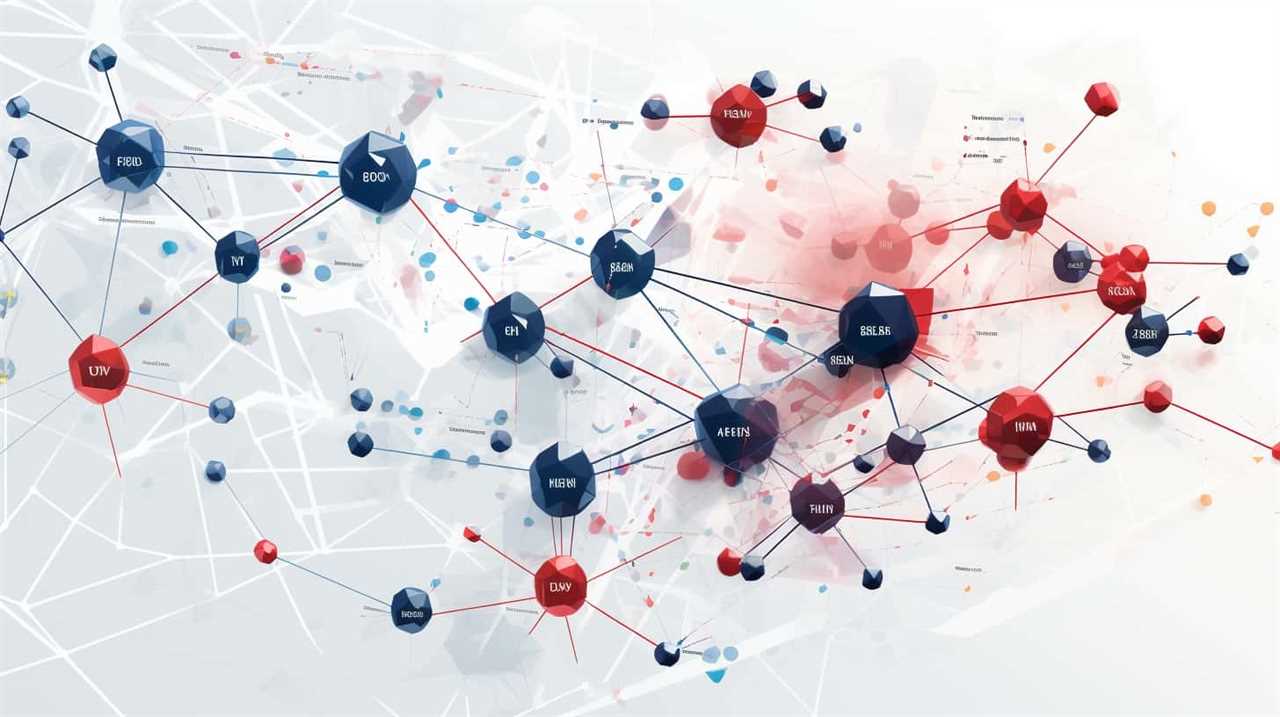Could we be on the brink of a crucial moment in drug studies? The emergence of artificial intelligence (AI) appears to be presenting endless opportunities.
But before we proceed, let’s pause and ask ourselves: what hurdles lie ahead? Data availability and quality, lack of interpretability and transparency, ethical and regulatory considerations, integration with traditional methods, and limited validation and clinical implementation.
In this article, we delve into these challenges, exploring the intricate world of AI in drug discovery.
Key Takeaways
- Sufficient data and reliable data sources are crucial for training AI algorithms in drug discovery.
- Lack of interpretability and transparency in AI models raises ethical concerns and can result in biased predictions.
- Ethical and regulatory considerations, including privacy safeguards and bias detection mechanisms, are essential for responsible use of AI in drug discovery.
- Integrating AI with traditional methods enhances the efficiency and effectiveness of the drug discovery process, improving cost effectiveness and enabling data-driven decision-making.

Data Availability and Quality
We need to gather and assess sufficient data to overcome the challenges of data availability and quality in AI-driven drug discovery. Data reliability and bias detection are crucial aspects that need to be addressed to ensure the accuracy and effectiveness of AI models in this field.
Reliable data sources, such as well-curated databases and high-quality clinical trials, are essential for training AI algorithms. Additionally, it’s important to implement robust techniques for detecting and mitigating bias in the data. This involves carefully examining the data for any systematic errors or inconsistencies that could introduce bias into the AI models.
By ensuring data reliability and effectively detecting biases, we can enhance the overall quality of the AI-driven drug discovery process. However, addressing these challenges is just the first step towards achieving a successful outcome.
Transitioning into the subsequent section, we’ll now explore the issue of lack of interpretability and transparency in AI models.

Lack of Interpretability and Transparency
To shed light on the challenges faced in AI-driven drug discovery, it is essential to address the lack of interpretability and transparency in AI models. While these models have shown promising results in identifying potential drug candidates, their inner workings remain largely opaque. This lack of interpretability raises ethical implications and algorithm bias concerns. Without understanding how AI models make decisions, it becomes difficult to ensure fairness, accountability, and trustworthiness in drug discovery processes. To illustrate this point, consider the following table that highlights the potential ethical implications and algorithm bias associated with the lack of interpretability and transparency in AI models:
| Ethical Implications | Algorithm Bias |
|---|---|
| Unfair treatment of certain patient populations | Unequal representation in training data |
| Lack of accountability for AI-generated recommendations | Biased predictions based on demographic factors |
| Limited ability to explain and verify AI decisions | Reinforcement of existing biases in drug discovery |
| Difficulty in identifying and addressing model errors | Limited access to the decision-making process |
These challenges emphasize the need for increased interpretability and transparency in AI models used for drug discovery. By doing so, we can ensure that the decision-making process is fair, unbiased, and accountable. In the subsequent section, we will delve into the ethical and regulatory considerations that arise from these challenges.

Ethical and Regulatory Considerations
As we delve into the ethical and regulatory considerations surrounding AI in drug discovery, it’s important to address the potential implications and safeguards that need to be put in place.
One major concern is privacy. AI algorithms require access to vast amounts of patient data, raising questions about how this information is collected, stored, and protected. Safeguards must be implemented to ensure strict adherence to privacy regulations and to prevent unauthorized access or misuse of sensitive data.
Another key consideration is bias detection. AI models are trained on historical data, which can inadvertently perpetuate biases present in the data. This raises concerns about the potential for biased decision-making in drug discovery processes. It’s crucial to develop robust mechanisms to detect and mitigate biases in AI algorithms, ensuring that they don’t perpetuate disparities in healthcare outcomes.

Integration With Traditional Drug Discovery Methods
Continuing the discussion on ethical and regulatory considerations, integrating AI with traditional drug discovery methods involves leveraging existing practices.
This integration offers several automation benefits and can significantly enhance the efficiency and effectiveness of the drug discovery process. By combining AI algorithms with traditional methods, researchers can leverage the vast amount of data available to identify potential drug candidates more quickly and accurately.
AI can analyze massive datasets, identify patterns, and predict the efficacy and safety of new compounds, saving time and resources. Moreover, AI can help optimize the selection of drug targets, predict drug-drug interactions, and facilitate the design of clinical trials.
This integration not only improves the cost effectiveness of drug discovery but also enables researchers to make data-driven decisions, leading to more successful outcomes.

Limited Validation and Clinical Implementation
One major hurdle in AI drug discovery is the limited validation and clinical implementation of AI algorithms. While AI has shown promise in identifying potential drug candidates, there is a need for rigorous data validation and clinical trials to ensure their safety and efficacy. The table below highlights the challenges associated with limited validation and clinical implementation:
| Challenges | Implications | Solutions |
|---|---|---|
| Lack of diverse and representative datasets | Biased predictions and limited generalizability | Collect diverse datasets and ensure proper data curation |
| Difficulty in translating AI findings into clinical practice | Ineffective integration of AI algorithms into healthcare systems | Collaborate with clinicians and regulatory bodies to establish guidelines for implementation |
| Limited validation in real-world scenarios | Unreliable predictions and potential risks for patients | Conduct extensive clinical trials to validate AI algorithms in real-world settings |
Addressing these challenges is crucial for the successful integration of AI in drug discovery, ensuring that AI algorithms are reliable, safe, and effective in clinical practice.

Frequently Asked Questions
Data Availability and Quality:
Data accessibility and validation are crucial for AI in drug discovery. We face challenges in ensuring the availability and quality of data. Overcoming these hurdles will enable us to leverage AI’s full potential in this field.
How Can We Ensure the Accuracy and Reliability of the Data Used in Ai-Driven Drug Discovery?
To ensure the accuracy and reliability of data in AI-driven drug discovery, we must focus on data provenance and validation. By tracing the origin of the data and rigorously verifying its quality, we can improve the overall trustworthiness of the AI models.
What Are the Challenges in Accessing and Integrating Diverse Data Sources for AI Models in Drug Discovery?
Accessing and integrating diverse data sources for AI models in drug discovery presents significant challenges. Overcoming interpretability limitations is crucial to ensure accurate and reliable results, enabling us to harness the full potential of AI in this field.
Are There Any Specific Strategies or Best Practices for Addressing Data Quality Issues in Ai-Driven Drug Discovery?
Strategies and best practices for addressing data quality issues in AI-driven drug discovery involve rigorous data preprocessing, validation, and augmentation techniques. These ensure reliable, accurate, and comprehensive datasets, empowering AI models to generate meaningful insights.
Lack of Interpretability and Transparency:
Overcoming limitations in interpretability and challenges in AI explainability are significant in drug discovery. We must find strategies to improve transparency and ensure that AI models can provide understandable and actionable insights.

Conclusion
In conclusion, while AI shows immense potential in revolutionizing drug discovery, several hurdles need to be addressed.
The limited availability and quality of data, lack of interpretability and transparency, ethical and regulatory considerations, integration with traditional methods, and limited validation and clinical implementation pose significant challenges.
To navigate these obstacles successfully, stakeholders must collaborate, invest in data infrastructure, and develop robust validation frameworks. Only then can we unlock the full power of AI and pave the way for groundbreaking discoveries in pharmaceutical research.









